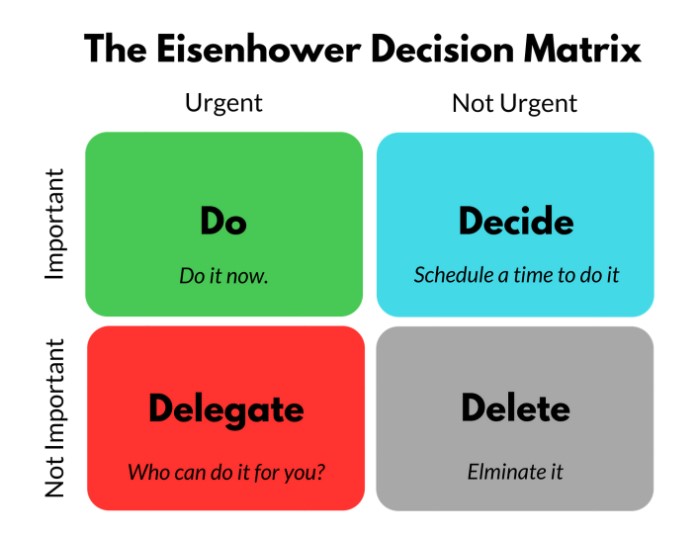I ran across an interesting article recently about what people say as they prepare to die. It summarized an interview by Health Digest, with leading palliative care and hospice specialist, Dr. Simran Malhotra. She shares firsthand how her patients have influenced the way she leads her own life in hopes it will inspire others to do the same.
Mostly about Regrets
- not spending more time with loved ones, including years lost with a loved one due to a trivial disagreement.
- too much time spent on work rather than dedicating time to themselves or their families.
- a lack of courage to pursue a life true to their innermost self.
As I read about the regrets, it brought up in my mind the two-by-two prioritization matrix or Eisenhower matrix. The Eisenhower Matrix gets its name from the 34th president of the United States, Dwight D. Eisenhower, who was quoted saying, “I have two kinds of problems, the urgent and the important”. Steven Covey created a tool around urgency and importance and named it after Eisenhower’s quote. The matrix is used to help rank tasks according to their urgency and importance.

Important & Urgent = Do It Now
We delay addressing the most important parts of our lives such as making time for God in order to get to know and love Him, visiting aging parents, calling old friends, healing old wounds – because although they are all truly important, right at this moment we would never classify them as urgent. There’s always tomorrow to get on that. Right? We rationalize by saying that “we are just too busy right now”. We’re too busy… that is until these important aspects of our lives force themselves to the forefront of our lives and then they become urgent. Priorities immediately shift as they move from the “important not urgent” quadrant to the “important and urgent” quadrant.
Until that shift happens we certainly do a lot of rationalizing. For example, I was told by a few friends that their plan is to go back to Mass, participate in the sacraments, and help the needy, blah, blah, blah (their words not mine) when they are retired and have – you guessed it – more time. They are putting off their friendship with God until a time that suits them. The “sins of omission” conversation with St. Peter is going to be awkward at the gates of heaven! No one, including God, appreciates a conditional relationship.
“Tempus Fugit, Memento Mori.” | “Time flies, remember death.”
When it comes to living fully, Dr. Malhotra encourages individuals to share their story and to find strength in a community of people that inspires and uplifts them. “Don’t be afraid to face your fears and embrace your vulnerabilities. These are the things that make us human and connect us to others. They are what make us real and raw and beautiful,”
Looking for Meaning
How?
I would conclude that in the end we are not “just” human beings but we are human beings made in the image and likeness of God. The desire to be known and loved and to live a life with meaning is infused into our very souls. Yet, without God in our lives, we don’t know our status as the eternal beings we are and that our search to be known and loved and to live with meaning will always be fruitless because we are looking for that acclaim and meaning from others on earth, not from our God who made us and who infinitely loves us in heaven.
The original article is here: https://www.healthdigest.com/920423/what-most-people-say-before-they-die-according-to-top-hospice-doctor-simran-malhotra-exclusive/
- Similar posts you might like:
- Satan's Sense of Ugency
- Calming Your Monkey Mind
- How The Enemy Diverts You From Righteous Deeds & Spoils Them




